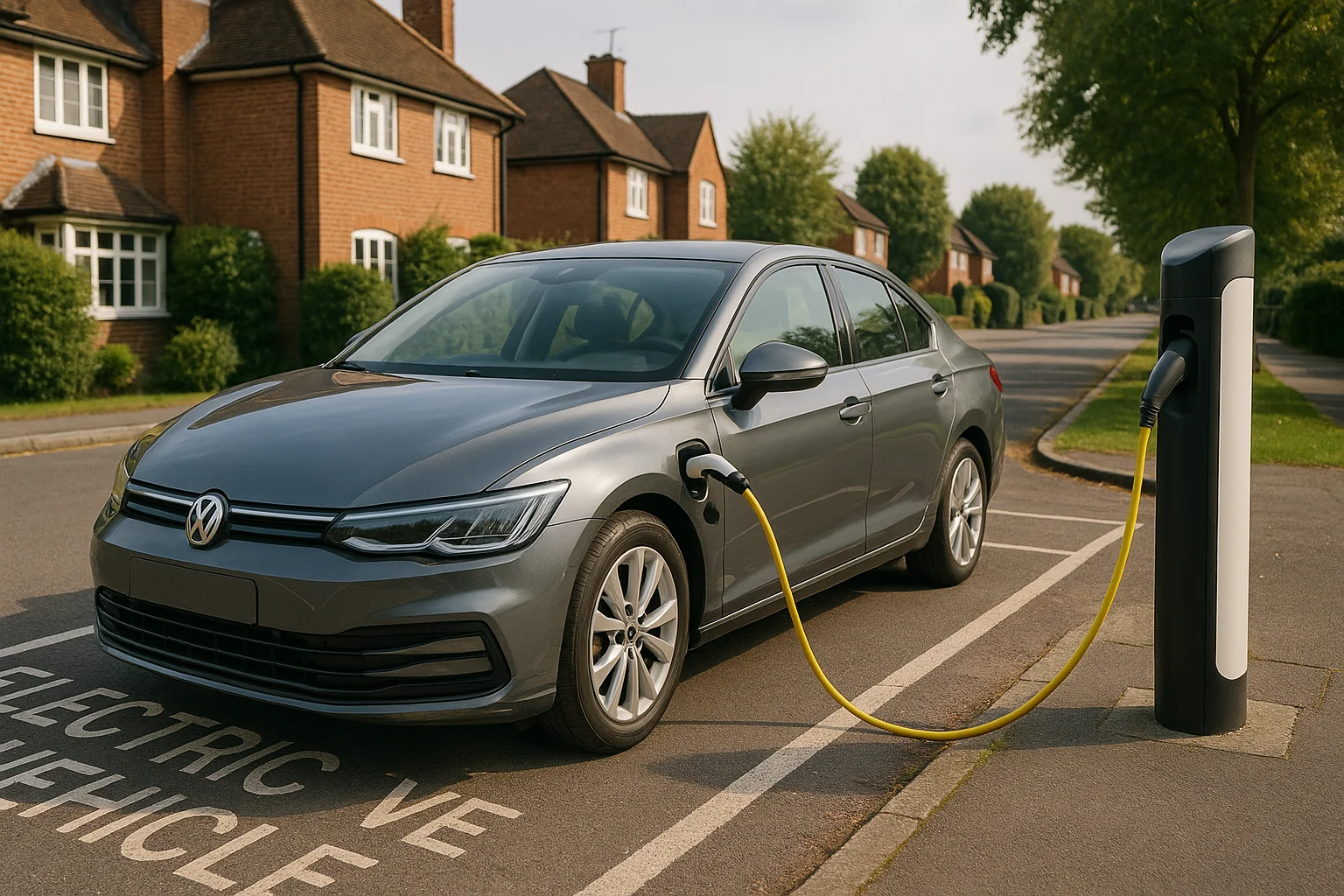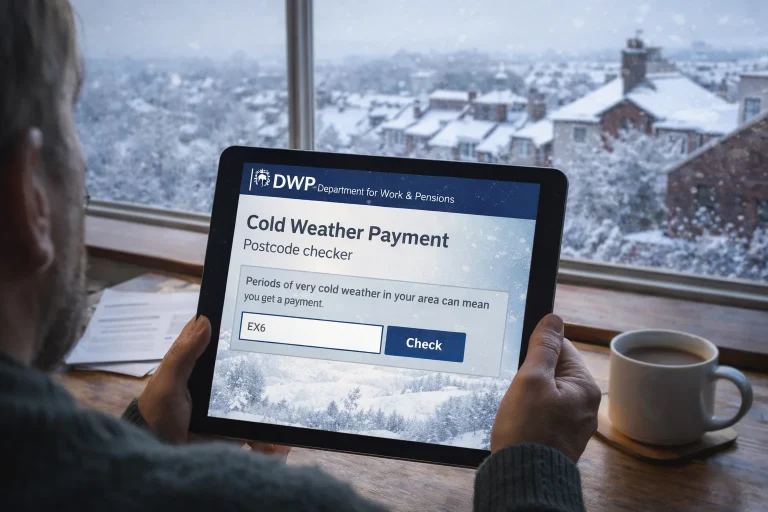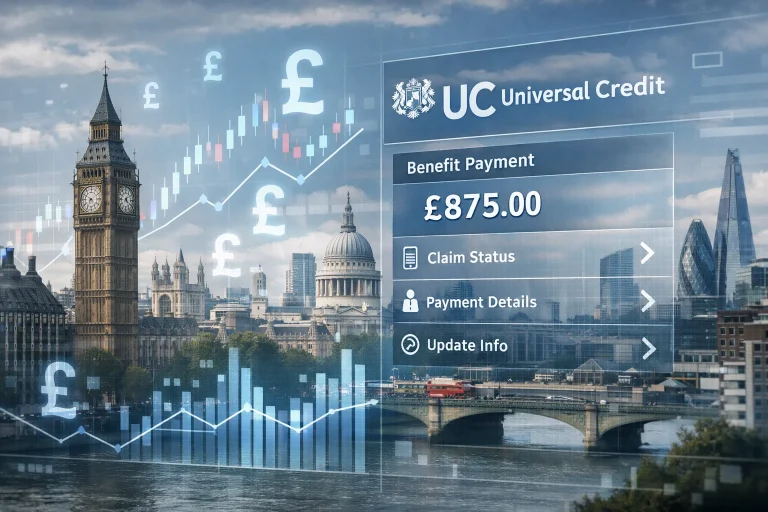Have you ever wondered how much it actually costs to charge an electric car in the UK? As more drivers switch from petrol and diesel to electric vehicles (EVs), understanding charging costs has become essential.
With energy prices fluctuating, charging networks expanding, and new government incentives emerging, it’s crucial to know what you can expect to pay, whether you’re plugging in at home, at work, or at a public station.
In this comprehensive guide, we explore how EV charging costs are calculated, what influences them, and how you can charge more efficiently and economically in 2025 and beyond.
What Are the Average Costs to Charge an Electric Car in the UK?
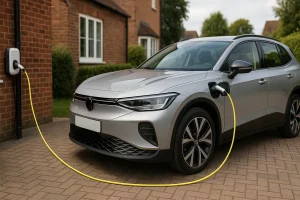
The cost to charge an electric car in the UK can vary widely depending on where and how you charge. On average, a full home charge costs between £4 and £20, while a rapid public charge typically ranges from £7 to £10 for an 80% top-up.
These figures are influenced by electricity tariffs, vehicle battery size, and the type of charger used. Home charging is generally the cheapest option, especially if you make use of an off-peak EV tariff, which can reduce costs to just 2–3p per mile.
In contrast, public charging tends to be more expensive, averaging around 13p per mile on standard fast chargers and up to 17p per mile on ultra-rapid networks. Despite higher public charging prices, they offer the advantage of speed and convenience, especially for long-distance travel.
How Much Does It Cost to Charge an EV at Home?
Charging at home remains the most economical and convenient method for most UK electric car owners. Once a home charging point (or wallbox) is installed, charging your EV overnight can be both cost-effective and energy-efficient.
On a standard electricity tariff of around £0.30 per kWh, charging a 60kWh battery would cost roughly £18 for a full charge. However, if you’re on an off-peak EV tariff offering rates between £0.10 and £0.15 per kWh, the same charge could cost as little as £6–£9.
The average cost per mile for home charging is around 7–8p, but this can drop to 2–3p per mile with an EV tariff, making it considerably cheaper than running a petrol or diesel car.
Example Home Charging Costs by Car Model
| Electric Vehicle Model | Battery Size (kWh) | Full Charge (Standard Tariff) | Full Charge (EV Tariff) | Range (Miles) |
|---|---|---|---|---|
| Nissan Leaf | 39 | £11.70 | £4.68 | 168 |
| Kia Niro EV | 64 | £19.20 | £7.68 | 282 |
| MG4 EV | 64 | £19.20 | £7.70 | 281 |
| Peugeot e-2008 | 50 | £15.00 | £6.00 | 206 |
Home chargers typically cost between £800 and £1,200 to install, though the government’s EV Chargepoint Grant can reduce this by up to £350. Once installed, the convenience of charging overnight, often while electricity rates are lowest, makes this the preferred choice for most EV drivers.
How Much Does It Cost to Charge an Electric Car in Public?
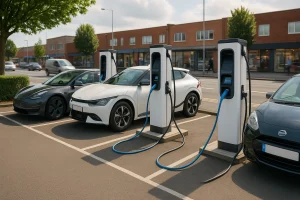
Public charging costs vary considerably depending on the provider, charger speed, and location. As of early 2025, the UK has surpassed 75,000 public charging points, including 14,000 rapid chargers delivering 50kW or more. These stations are spread across supermarkets, car parks, hotels, workplaces, and motorway service areas.
The average pay-as-you-go (PAYG) prices for public charging are as follows:
- Slow and Fast Chargers (up to 22kW): Around £0.53 per kWh (approximately 16p per mile)
- Rapid and Ultra-Rapid Chargers (50kW–350kW): Around £0.81 per kWh (approximately 24p per mile)
For example, a Volkswagen ID.3 with a 58kWh battery would cost around £31 to fully charge on a fast charger, or approximately £8–£9 at home with an EV tariff.
Comparison of Major UK Charging Networks
| Charging Network | Rate (per kWh) | Notes |
|---|---|---|
| Tesla Supercharger | £0.44–£0.49 for Tesla owners; £0.60–£0.67 for non-Tesla | Fastest and most reliable network |
| BP Pulse | £0.70–£0.79 PAYG; £0.45 with subscription | Discounts for members |
| Shell Recharge | Around £0.80 | App and loyalty discounts available |
| Source London | £0.44–£0.60 | Strong coverage in major cities |
| ChargePlace Scotland | Free to £0.30 | Subsidised in many locations |
Public charging offers unmatched flexibility, particularly for those who travel frequently or lack off-street parking. However, costs can accumulate quickly compared to home charging, especially when relying on ultra-rapid options.
What Factors Affect the Cost of Charging an Electric Car?
Several key factors influence how much it costs to charge an EV:
Electricity Tariff: Your home electricity rate has the greatest impact. Standard rates average around £0.30 per kWh, but EV-specific tariffs such as Octopus Go or OVO Charge Anytime offer rates as low as £0.07–£0.12 per kWh during off-peak hours.
Charging Speed: Rapid and ultra-rapid chargers deliver power quickly, but this convenience comes at a higher per-kWh cost compared with slower home or workplace chargers.
Battery Size: Larger batteries store more energy, meaning they cost more to fill from empty. However, they often provide longer range per charge.
Location: Public chargers in high-demand areas, like London or motorway services, tend to be more expensive than suburban or workplace chargers.
Membership Plans: Many charging networks provide cheaper per-kWh rates for members or subscribers compared to pay-as-you-go users.
Understanding these factors allows EV owners to optimise where and when they charge, balancing cost, convenience, and energy efficiency.
How Do Charging Costs Compare by Location?
The table below summarises typical EV charging costs across different locations and setups in the UK:
| Location | Approximate Cost per Full Charge | Average Cost per Mile | Charging Speed | Typical Usage Scenario |
|---|---|---|---|---|
| Home (Standard Tariff) | £10–£20 | 7–8p | 6–10 hours | Regular overnight charging |
| Home (EV Tariff) | £4–£10 | 2–3p | 6–10 hours | Off-peak smart charging |
| Public Fast Charger | £26–£40 | 13p | 1–2 hours | Urban or destination top-ups |
| Public Rapid Charger | £7–£10 (80%) | 17p | 30–45 mins | Motorway and long trips |
These averages demonstrate that home charging remains the most cost-efficient option, especially with an EV tariff or smart charging schedule.
How Can Drivers Access and Pay for Public Charging?
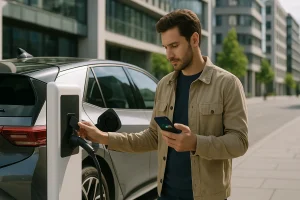
Most public charging networks operate through smartphone apps, which allow users to locate, activate, and pay for charging sessions. However, some also provide RFID (radio frequency identification) cards, which enable contactless access to chargers.
Major RFID and app-based providers in the UK include Polar, GeniePoint, Ecotricity, Shell Recharge, and ChargeYourCar. Drivers can also use mapping tools such as Zap-Map, Source London, and the National Chargepoint Registry to find compatible stations.
These platforms display real-time availability, charging speeds, and pricing information, helping drivers plan trips more efficiently.
What Is the UK Government Doing to Improve EV Charging Affordability?
The UK government continues to invest heavily in the EV charging infrastructure to encourage nationwide adoption. A key initiative includes a £500 million investment over the next five years to support the expansion of a fast-charging network, ensuring that no driver is ever more than 30 miles from a rapid charger.
Other supportive schemes include:
- The EV Chargepoint Grant, which offers up to £350 towards home charger installation.
- The Workplace Charging Scheme (WCS), providing businesses with funding to install chargers for employees.
- Tax incentives for electric company cars and zero-emission vehicles.
- Continuous expansion of renewable energy generation to lower the long-term cost of electricity.
These policies are designed not only to improve accessibility but also to make charging an electric car more affordable and sustainable for everyone.
How Do EV Charging Costs Compare with Petrol and Diesel?
Although electricity prices have risen in recent years, EVs still offer major long-term savings compared to petrol or diesel vehicles. The following table demonstrates the average cost per mile across different energy types:
| Fuel Type | Energy Cost per Unit | Efficiency (Miles per Unit) | Cost per Mile |
|---|---|---|---|
| Electric (EV Tariff) | £0.12/kWh | 3.5 miles | 3.4p |
| Electric (Public Rapid) | £0.80/kWh | 3.5 miles | 22.8p |
| Petrol | £1.50/litre | 10 miles | 15p |
| Diesel | £1.60/litre | 12 miles | 13.3p |
Even when charged at public rapid rates, electric cars can still rival and often beat, the per-mile costs of petrol or diesel. When charged at home, they are substantially cheaper to run.
What Does the Future Hold for EV Charging Costs in the UK?
The future of EV charging costs in the UK looks increasingly positive. As renewable energy generation expands and battery efficiency improves, electricity prices for EV charging are expected to stabilise or even decline.
The development of smart grids and dynamic tariffs will also allow drivers to automatically charge during the cheapest periods. Furthermore, technological advancements such as vehicle-to-grid (V2G) systems could enable EV owners to sell unused energy back to the grid, offsetting charging costs altogether.
By 2030, it’s predicted that the average home charging rate could fall below £0.10 per kWh, thanks to renewable overproduction and intelligent energy management systems. These advancements will make electric cars not only greener but also more affordable than ever before.
Conclusion
So, how much does it cost to charge an electric car? The answer depends on where and how you charge, but most UK drivers pay between £4 and £20 for a home charge or £7–£10 for a rapid top-up. Home charging, especially when paired with an EV tariff, remains the most affordable and efficient option, often costing as little as 2–3p per mile.
As public networks expand, tariffs improve, and government funding strengthens infrastructure, electric vehicles are set to become even more cost-effective and practical. The combination of reduced running costs, lower maintenance, and zero tailpipe emissions makes EVs a financially and environmentally smart choice for the future of UK transport.
FAQs About Electric Car Charging Costs
How can drivers reduce their EV charging costs?
Switching to an EV-specific tariff, charging overnight during off-peak hours, and using free workplace or supermarket chargers can significantly reduce costs.
Is it better to charge every day or wait until the battery is low?
Most experts recommend keeping the battery between 20% and 80%, rather than letting it drop too low or charging it to 100% every day.
Are there still free EV charging points in the UK?
Some councils, retailers, and hotels continue to offer free charging, though these are gradually being replaced by paid options.
Does rapid charging affect battery health?
Occasional rapid charging is safe, but consistent use can slightly increase battery degradation compared to slower home charging.
Can I charge my EV without a smartphone app?
Yes. Many networks accept contactless bank cards or offer RFID cards for easy access.
Is workplace charging cheaper than public charging?
In most cases, yes. Many employers subsidise workplace charging or provide it free to employees.
Will EV charging costs continue to decrease?
As renewable energy generation grows and charging networks become more efficient, long-term EV charging costs are expected to fall.
{
“@context”: “http://schema.org/”,
“@type”: “FAQPage”,
“mainEntity”: [
{
“@type”: “Question”,
“name”: “How can drivers reduce their EV charging costs?”,
“acceptedAnswer”: {
“@type”: “Answer”,
“text”: “Switching to an EV-specific tariff charging overnight during off-peak hours and using free workplace or supermarket chargers can significantly reduce costs.”
}
},
{
“@type”: “Question”,
“name”: “Is it better to charge every day or wait until the battery is low?”,
“acceptedAnswer”: {
“@type”: “Answer”,
“text”: “Most experts recommend keeping the battery between 20% and 80% rather than letting it drop too low or charging it to 100% every day.”
}
},
{
“@type”: “Question”,
“name”: “Are there still free EV charging points in the UK?”,
“acceptedAnswer”: {
“@type”: “Answer”,
“text”: “Some councils retailers and hotels continue to offer free charging though these are gradually being replaced by paid options.”
}
},
{
“@type”: “Question”,
“name”: “Does rapid charging affect battery health?”,
“acceptedAnswer”: {
“@type”: “Answer”,
“text”: “Occasional rapid charging is safe but consistent use can slightly increase battery degradation compared to slower home charging.”
}
},
{
“@type”: “Question”,
“name”: “Can I charge my EV without a smartphone app?”,
“acceptedAnswer”: {
“@type”: “Answer”,
“text”: “Yes. Many networks accept contactless bank cards or offer RFID cards for easy access.”
}
},
{
“@type”: “Question”,
“name”: “Is workplace charging cheaper than public charging?”,
“acceptedAnswer”: {
“@type”: “Answer”,
“text”: “In most cases yes. Many employers subsidise workplace charging or provide it free to employees.”
}
},
{
“@type”: “Question”,
“name”: “Will EV charging costs continue to decrease?”,
“acceptedAnswer”: {
“@type”: “Answer”,
“text”: “As renewable energy generation grows and charging networks become more efficient long-term EV charging costs are expected to fall.”
}
}
]
}

